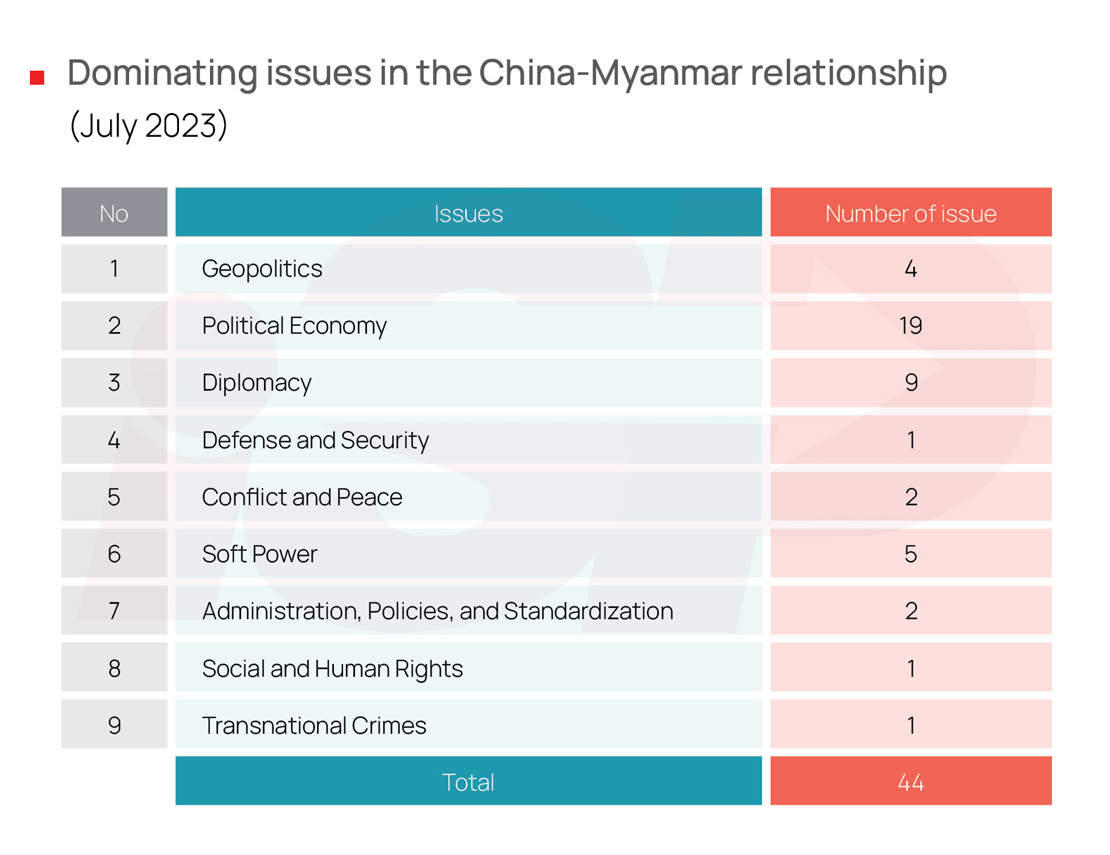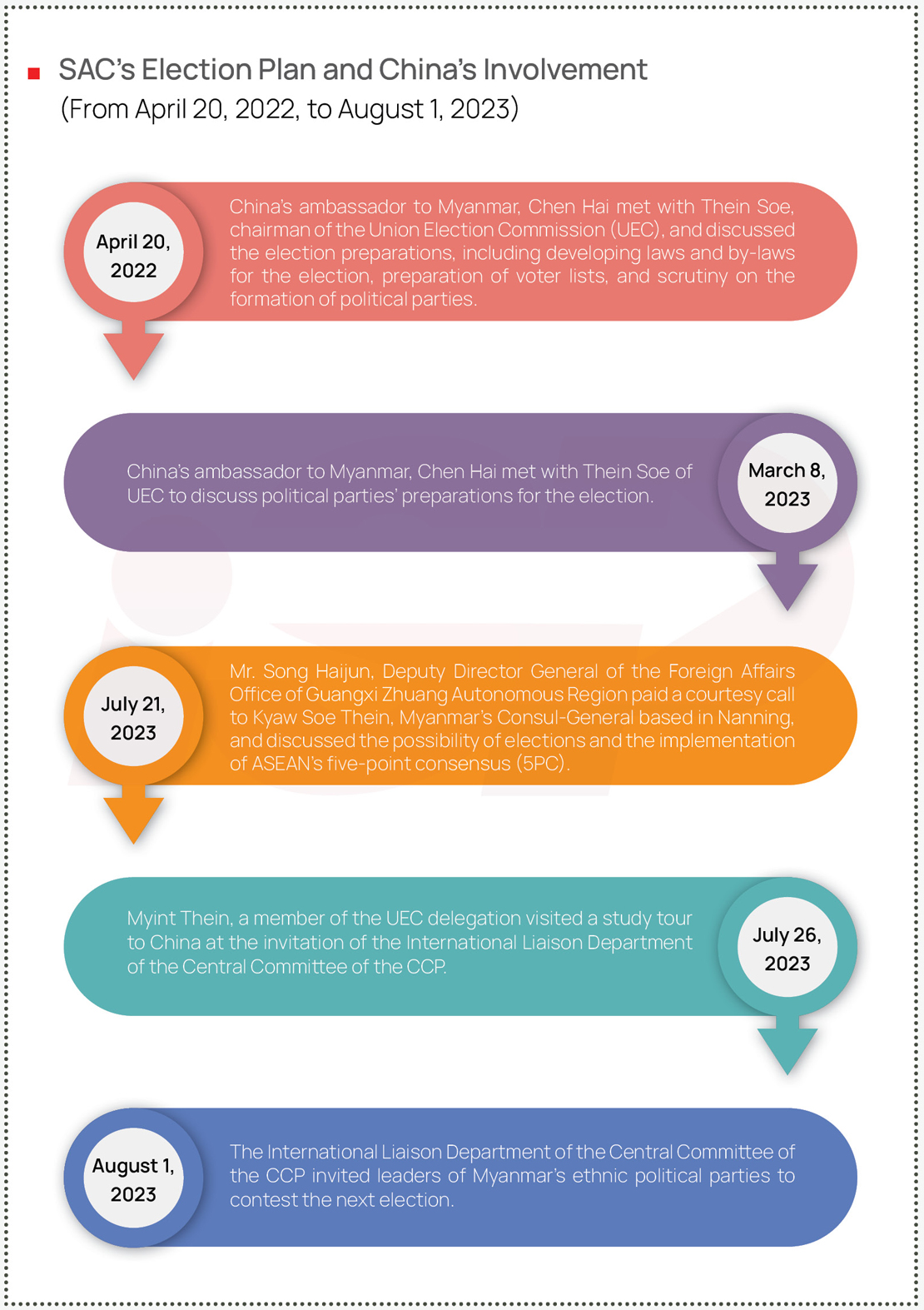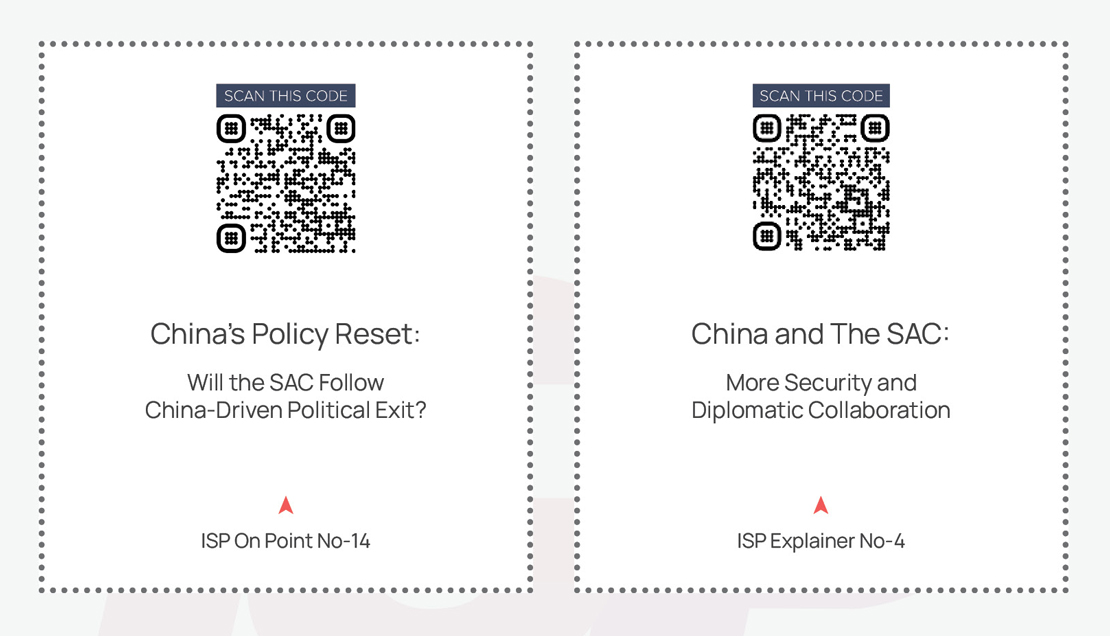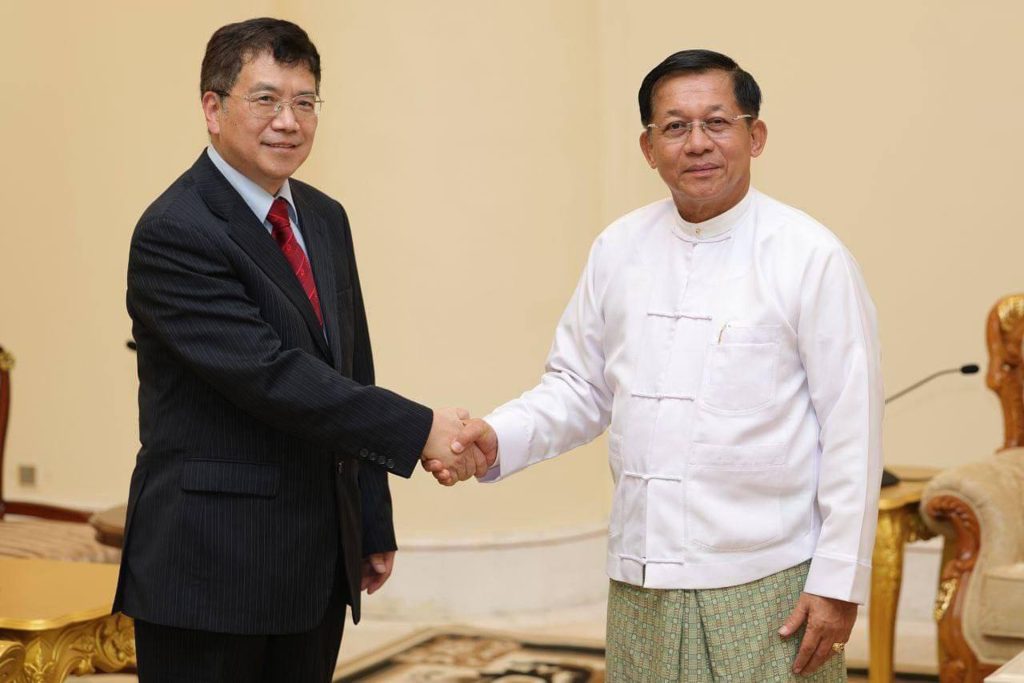ISP Explainer No. 05
This Explainer is published on August 15, 2023, as a translation of the original Burmese language version that
ISP-Myanmar sent out to the ISP Gabyin members on August 11, 2023.
This discussion focuses on the development of China-Myanmar relations based on ISP’s timeline collections which follow trends on particular subjects. Recently, the State Administration Council (SAC) extended its rule by six months while also outlining high priority on holding ‘free and fair democratic multiparty elections’ in its future programs. Concurrently, China’s involvement with the SAC’s implementation of the election process has been seen to grow. While has China expressed discontent with the junta’s management of tackling transnational crime, it remains committed to enhancing bilateral trade standardization, cooperation, and promoting President Xi’s three Global Initiatives among the people of Myanmar. This process also enables the junta’s to engage more directly in international discussions and fora through various ASEAN-China meetings.
Summaries of forty-four issues around the bilateral relationship
When analyzing ISP-Myanmar’s timelines of information on China-Myanmar relations, forty-four important issues were collected in July (See the table below). Of these, political economy and diplomacy have dominated the relationship. This paper discusses five crucial issues in brief.


1.SAC’s Election Plan and China Pays Special Attention
At the end of July the State Administration Council extended its rule by six months and is set to hold a ‘free and fair democratic multiparty election’. Concurrently, China’s involvement with the SAC’s implementation of the election process has been seen to grow. This has resulted in the development of the new ‘ASEAN Minus’ trend — whereby individual countries’ resort to unilateral efforts to resolve the Myanmar crisis rather than maintain the whole of ASEAN approach (See ISP Insight email No. 20).
In July 2023, the International Liaison Department of the Central Committee of the Chinese Communist Party (CCP) invited SAC’s Union Election Commission (UEC) for a study tour. Officials of the UEC first visited Cambodia to observe the national election there, and subsequently embarked on the secondary tour to China. On the tour, UEC officials learned about China’s liberalization and open door policy, Belt and Road Initiative (BRI), the processes behind political party building, and how China holds elections. The UEC tour to China happened after a meeting with Myanmar’s Consul-General based in Nanning and a Deputy Director General of the Foreign Affairs Office of Guangxi Zhuang Autonomous Region on the possibility of an election in Myanmar and the process of implementation of ASEAN’s five-point consensus (5PC).
On August 1, the International Liaison Department of the Central Committee of the CCP extended an invitation to leaders of Myanmar’s ethnic political parties. This invitation seeks to facilitate discussions on the upcoming election, while also fostering dialogues on local governance involving Myanmar’s parties and the CCP’s regional and provisional administration. In the lead-up to these study tours, China’s ambassador to Myanmar, Chen Hai, held two meetings with the chairman of the Union Election Commission (UEC) in 2022 and 2023. These interactions aimed to gather insights on the status of political parties, the progress of voter list preparation, and the development of essential election laws and by-laws.

2.Bilateral Economic Corridors and Standardization
Along with the implementation of the China-Myanmar economic corridors, Chinese authorities have pushed for streamlining of technical standardization between the two countries. Dehong Prefecture of Yunnan Province, China have mainly taken the initiative on this front. Dehong People’s Government first held meetings with the SAC on July 26 to discuss extending flights between Mangshi and Mandalay, connecting railways between the two countries, and China exporting goods through Yangon Port. Before this meeting, on July 24-25, the Dehong Prefecture Government encouraged the Myanmar Chinese Chamber of Commerce to cooperate in infrastructure development, fostering logistics and transportation, and exporting Myanmar products to the China market. The Chinese officials encouraged greater exports of Myanmar agricultural, husbandry, and fisheries products to China either through traditional commerce or through e-commerce. The SAC subsequently made an announcement on August 7, encouraging Myanmar traders to register 18 types of export products with the General Administration of Customs of China (GACC) and an additional seven products along with recommendations from the respective department.
Meanwhile, foreign ministry officials of the two countries discussed a Joint Inspection of the China-Myanmar Boundary, applying aerial maps along the border as well as other technological matters. Since 1961 China and Myanmar have agreed to conduct a joint border inspections every five years. However in actuality these joint surveys have only been conducted twice, in 1984-86 and 1992-95. The previous NLD government had prepared a third border survey, but this remains incompleted. The SAC has continued to follow the procedural approach to this joint-survey and the meeting on the subject was the first held since Myanmar’s military coup. This initiative is strategically aligned with the implementation of cross-border economic cooperation zones(CBECZs), coinciding with efforts in the post-COVID era (See ISP Explainer No. 4).
In addition, the two countries have agreed on building a ‘sister city’ relationship between China’s industrial city Qilin and Kyaukphyu of Rakhine State. Qilin City could play an important role in the development of the Kyaukphyu industrial zone under the China-Myanmar Economic Corridor (CMEC).

3.Encouraging Greater Myanmar Involvement in China’s Global Initiatives
China is actively advancing its campaign to promote President Xi’s three Global Initiatives within the Myanmar populace through media channels. During the first week of July, the Chinese ambassador to Myanmar engaged in discussions with various entities. These discussions involved members of the Myanmar Press Council, the Myanmar Film and Theatrical Performance Associations, and Shwe Thanlwin company, which owns Sky Net TV. The ambassador elaborated on the concept of China’s Global Civilization Initiative (GCI) and sought their collaboration in disseminating the concept. Additionally, in May, the Chinese embassy in Myanmar organized an event, bringing together nearly 20 media groups from both China and Myanmar. This event served as a platform to introduce the idea behind the Global Security Initiative (GSI).
The SAC has already committed to supporting the principles of the GSI and the two countries are trying to link the idea with Lancang-Mekong Cooperation (LMC) projects in the region. China initiated a GSI pilot zone in the Mekong region in order to collaborate in combating transnational crime. Chinese embassy officials in Myanmar have said the GDI and GCI programs will be implemented in the LMC. The SAC has been invited to participate in the Global Development Initiative (GDI) forum and the SAC delegation attended the First High-Level Conference of the Forum on Global Action for Shared Development, convened in Beijing on July 9-10, 2023.
Shortly after, on July 14, Chinese embassy officials in Myanmar, delegation members from LMC countries, and the Myanmar Institute of Strategic and International Studies (MISIS) held a conference on ongoing threats and possible combat measures posed by non-conventional security matters including issues of terrorism, online gambling, and communication fraud, and human trafficking, entitled to GSI.
4.China Pushes for Internal and Border Stability with Myanmar
Deng Xijun, China’s special envoy for Asian Affairs, undertook his third visit to Myanmar during the final week of July. This visit closely followed a meeting between Thailand’s Foreign Minister, Don Pramudwinai, and the incarcerated Aung San Suu Kyi. The issues Deng raised with SAC leaders included Myanmar’s politics, enhancing economic cooperation between the two countries, China’s relief assistance to affected victims of Cyclone Mocha, and the repatriation of Rohingya refugees. They also discussed collaborative efforts in countering online gambling fraud along the shared border. Notably, Deng was unable to meet with Aung San Suu Kyi on this trip.
Conversely, China seems to be dissatisfied with the State Administrative Council’s (SAC) perceived little effectiveness in combatting transnational crime. Chen Hai, Chinese ambassador to Myanmar met with SAC’s Foreign Minister Than Swe on July 25, stressing the need for collaborative action to address criminal activities operating along the China-Myanmar border. He added that despite these collaborative efforts, telecommunications fraud, particularly in the northern part of Myanmar and its border regions, continues to be rampant, causing significant harm to the interests of the people of both China and Myanmar. The ambassador also highlighted the need for rescuing Chinese trapped by criminal gangs in Myanmar and to eliminate the remnants of illegal online gambling. China’s interest in combating online fraud activities and cross-border crime is not limited to Myanmar. On July 8, Xu Ganlu, China’s Vice Minister of Public Security and Commissioner of the National Immigration Administration of China met with Thailand’s Deputy Prime Minister Prawit Wongsuwon; he raised the same issue, on bilateral cooperation to enforce the suppression of transnational crime, call center scams, and cybercrime.
Prior to these events, in July three armed forces of the Northern Brotherhood Alliance made a joint statement calling for cooperation to ensure stability in the territories under their control and for the suppression of crime and terrorism. The eight-point statement stressed that strong measures will be taken against anyone who disrupts international investment projects, thinly veiled language to describe Chinese interests in the area. The joint statement also called for no interference or taxation on investment companies or individuals, and also that the three armed forces would pursue effective legal action against anyone who commits crime.
5.Enhancing Cooperation through ASEAN-China Fora
China is actively advancing enhanced cooperation with the leaders of the State Administrative Council through the ASEAN-China Centre (ACC) platform. Throughout July, the ACC convened no fewer than five meetings under the ASEAN-China Forum’s banner. The discussions focused on the promotion of trade and investment, as well as collaboration across sectors encompassing education, culture, tourism, news, and media. Notably, SAC ministers actively participated in these meetings. Within this context, SAC ministers sought to use them to create opportunities to harness technology and expertise for Micro, Small, and Medium Enterprises (MSMEs), with the specific goal of establishing a Digital Economy Innovation and Entrepreneurship Center within Myanmar. Further aims encompassed the streamlining of standardization efforts between Guangxi and Myanmar, as well as fostering more robust cooperation within the ASEAN-China Greater Bay Area Economic Cooperation, including Myanmar’s involvement in the Qianhai Forum.
In addition, Shi Zhongjun, Secretary-General of the ACC visited Naypyitaw and met with SAC’s Foreign Affairs, Education, and Hotel and Tourism Ministers. On July 17 in Chongqing, the China-ASEAN Legal Research Center also signed a Memorandum of Understanding (MoU) with SAC’s Ministry of Legal Affairs, focused mainly on cooperation in research needed in drafting law and in the fields of legal knowledge development. Dr. Thida Oo, SAC Legal Affairs Minister stated that the purpose of the MoU was for exchanging knowledge on differences in the legal system, language, political policy, and cultural norms and will be effective in deepening cooperation in legal affairs between the two countries. This collaboration effectively positions the junta to partake in international discussions through the ASEAN-China platform.
Similarly interesting, during July’s ASEAN Regional Forum held in Indonesia, China’s recently re-appointed Foreign Minister Wang Yi talked to Thailand’s Foreign Minister Don Pramudwinai concerning Myanmar. Wang Yi stressed the importance of Pramudwinai’s recent trip to Myanmar as a pragmatic approach to resolving the crisis in Myanmar and also urged all parties to continue working in cooperation with ASEAN. Wang Yi affirmed that China will play a constructive role with its own approach to Myanmar. In parallel with ASEAN’s attempt to resolve Myanmar’s problems, Thailand, and China are seemingly approaching a a new form of ‘Neighborhood Diplomacy’ towards Myanmar (See ISP OnPoint No. 14).

